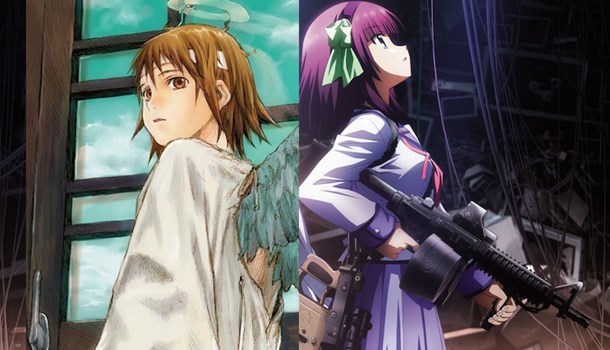
Written by Richard Durrance on 19 Jul 2020
Obligatory meandering intro
In between trying to watch, and being deeply disappointed by both Soul Eater and Broken Blade, I just happened to spin Haibane Renmei and Angel Beats. The combination was pure chance, yet as Angel Beats played out I suddenly realised how much the two had in common, and just how different they were.
I should probably start by saying that Haibane Renmei is one of my all-time favourite series and Angel Beats I’d only ever seen the once and some years ago – and then I only really remembered enjoying it more than I thought I would. On the face of it Haibane Renmei and Angel Beats seem pretty chalk and cheese but numerous themes and ideas run between them in parallel, both I’d say are quite unusual and hopefully by the end of this you will either want to seek them out if you’ve not watched them before will or if you have, be persuaded to revisit them, a very worthwhile indulgence. Some might even say a joy.
Some of the similarities are no more than skin deep, Haibane Renmei runs for 13 episodes and Angel Beats 12 plus an OVA. That said both series last just the right length of time, any attempt to draw out into 22 to 26 episode series would have dragged and both are perfect examples of series with absolutely no fat on them – excepting perhaps the OVA to Angel Beats.
Now then, be warned, the odd spoiler awaits… I’ll try not to be too wild though.
Stylistically the series don’t match up in the least. Haibane Renmei is more restrained, it has a precision to the design (courtesy of Yoshitoshi ABe) and tends towards a form of fantastical realism that Angel Beats is not interested in. Fair play to it, Angel Beats tends towards a sense of the riotous, without ever being riotous – the humour forever present without ever taking over. Equally, Haibane Renmei is suffused with humour but that humour is of a calmer form.
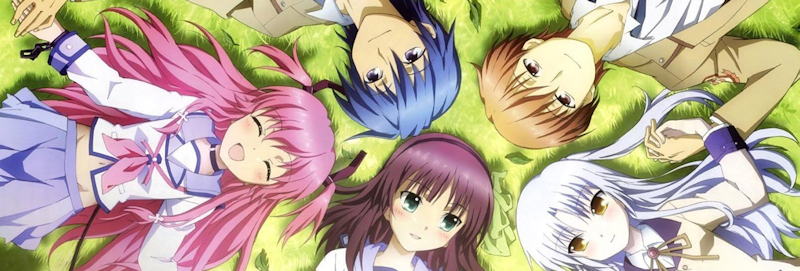
And what are they about, exactly?
Read up yourself... Okay, cursory information incoming that won’t really give you an idea of what they are about but anyway…
Haibane Renmei follows the Haibane: the winged and halo'd inhabitants of Old Home, in particular the newly hatched (yes they hatch from eggs) Rakka, who learns to understand the place of Haibane in the impenetrably walled city of Glie. Named after their dreams, Rakka finds herself drawn to and needing to help Reki take her Day of Flight and leave Glie…
Angel Beats also follows a newcomer, and damn if Otonashi doesn’t suddenly find himself at a school, with no memory of the past, in the middle of a firefight. He's drawn into the Afterlife Battlefront’s (or whatever they decide to call themselves on any given day) battle against God and God’s agent: Angel.
The Angel Element…
But let’s dispense with the obvious, the angelic element. Angel Beats starts with re-birth, our protagonist appearing as… well, one supposes an angel of sorts. Rakka in Haibane Renmei hatches from a giant egg, but sprouts wings and is given a halo, even if it takes a while to stick.
Then again, Angel Beats is upfront: You Sir are dead… Otonashi is told straight up by head of the Afterlife Battlefront, Yuri that he’s dead and God is not on your side; so pick up a gun and fight like the not-quite dead. It sets up its premise in the first moments (thankfully without tedious exposition – just good honest startling “decide now Otonashi, take a side or else…”). On the other hand Haibane Renmei, true to the ambiguity of the series in general, gives little away. Yes, the Haibane have wings (though hardly capable of normal flight) and they are given halos (from a steaming pan) but we never actually know if the Haibane are dead or not, yet we assume that the Sin Bound, such as Reki and possibly our protagonist, have killed themselves and thus, found themselves in Glie. Or perhaps they are all products of suicide. Are they angels? Well, you decide.
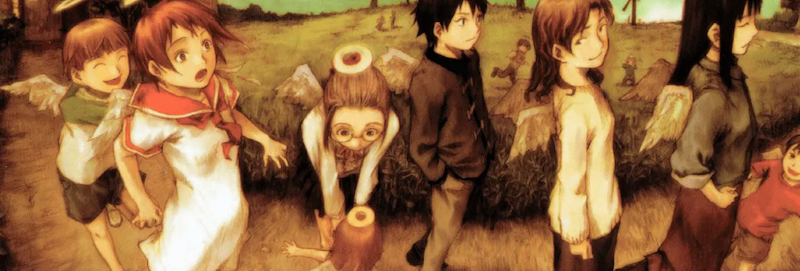
Trapped in Limbo?
Beyond being in a high school, and there being a large number of students who are not angels but NPCs, Angel Beats doesn’t directly state that our group are in limbo, but it feels that way; it’s a place that those who died having known hardship in their lives go to find fulfilment and be released (to Heaven?). This feels similar to Haibane Renmei, which may be limbo – if it is it is a far more benign limbo, the residents of Glie being quietly protective and loving of their Haibane residents. Angel Beats presents it’s undead-dead-angels-whatever as at war, comedic war but war nevertheless – and with God (why do I think Michael Moorcock would love that?). The Haibane are more likely, especially Reki and Rakka, to be at war with themselves.
Regardless of whether the conflict is internalised or externalised, both series can be read to have their arena as a form of stylised limbo and soon thematically they start to really match: Angel Beats has those unfulfilled souls gaining fulfilment and disappearing, being released from limbo. Haibane Renmei has the Haibane finding some form of inner peace or self-forgiveness and they depart Glie in a blessed light, one supposes to somewhere better.
Of course our two limbos could not be more different and on the surface; Angel Beats presents a pretty normal series of classrooms and outside spaces that a billion school based anime trundle out, but under the surface (literally as much as metaphorically) this is not always the case: the Afterlife Battlefront have an enormous booby-trapped facility below ground (they can literally create anything they can remember from their past lives). Arguably the underground facility, which appears in various forms, is perhaps the most intriguing environmental element of Angel Beats, but Haibane Renmei pushes more towards a sense of world building than base-building.
Glie feels like a fully realised place, and one of the great strengths of Haibane Renmei is the feeling – as with all great stories – that the city existed before, and will continue to exist, long after our characters are gone. In 13 episodes it manages to create a rich environment, whether the library, bakery, the bell tower or the mysterious spaces within the inescapable walls of Glie, there’s a sense of it existing fully, of stories and histories that we’ll never know or understand, but if you’re patient enough, search hard enough, live long enough, may slowly begin to understand.
In that sense, Glie is a place you could live, a limbo for the life, whereas Angel Beats presents a school that may provide community, but not one that exists for the long term. It is a pace to escape, either by railing against God all guns blazing, or through resignation and capitulation. Albeit with laughter along the way.
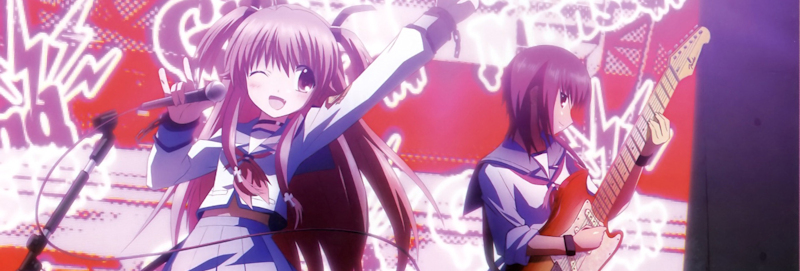
If music be the food of anime, play on…
Angel Beats has the more immediate connection to music, with the rebel group also performing in a band. But both series have music in the blood, though the way in which it's utilised by each is markedly different. Maybe it’s because I’m such a poor anime dilettante but I cannot remember a single series that doesn’t have a theme song (or overt contemporary instrumental – Texhnolyse goes in for banging techno and it does have some spoken vocals, though performed by Juno Reactor, not the series composer) except for Haibane Renmei.
The title theme and music by Kow Otani (pretty sure in my DVD Kow is written Koo, but anyway) is both quietly lovely and perfectly fitting. In terms of soundtracks espousing a mood that the series wants to evoke – quiet beauty, gentle but soaring – his orchestral theme stands out as unique and unusually beautiful. How many anime have either jarring intro songs or else step into cliché? Too many to number. (It’s a bloody horror series so we have to have a bland heavy rock / metal track right? It’s enough to let Angel get you!). Otani’s music suffuses the series with a pitch perfect feel that gently stirs and reflects emotions felt both by the characters and the audience (assuming you’re feeling it) without ever being showy or heavy-handed; it’s a masterclass of subtle evocation that could really go to town but like the characters in the series tends to keep the feeling taut and under the surface of its orchestration.
And of course with a name like Angel Beats you can be pretty damn sure that music plays a reasonable part and it does – we’re at a school so it’s got to have a school band, with the intriguingly absurd name of Girls Dead Monster (on par in randomness with Screaming Seagull Kiss Her Kiss Her) appears throughout (in somewhat different forms). For me two things matter when you introduce a band in a series: are they any good, and does it get in the way of the story? There’s nothing worse than watching, well, anything, only for an execrable musical number to suddenly bring the story to a halt. It is screen time wasted. In a general sense I think musical numbers are hard to get right, hark back even to Fred Astaire and Ginger Rogers and their best films tend to be comedies that include musical numbers which actually move the narrative on; or the films of Howard Hawks, who was director who knew who to get his lead actress to sing a song and turn it into an act of character and story development par excellence… and with a catchy tune to boot. That is illustrious company and Angel Beats recognises both are necessary and gets both right. The songs really hit the mark, and Girls Dead Monster function as part of the plot, are part of the Afterlife Battlefront and at least a couple band members have distinct story arcs. No background noise there. I’ll be honest I’m often not a huge fan of songs in anime – even most opening and credit sequence songs I find all too frequently tiresome (whether the issue is with me or the choice of songs I don’t know, maybe it’s just a problem of not enough Yuki Kajiura to go around!) so the thought of music being prominent is a warning that I may start to hit the skip button, but Angel Beats has a rollicking soundtrack that you can tell a great deal of thought and energy has gone into, and it is carefully matched to the series.
Two steps forward one step back and so on and so forth
Watching Angel Beats a second time after a lapse of years it hit me how the series really broke down into three sections - fear not, no three act structure lecture incoming – each is distinct in tone but merging into a whole. Haibane Renmei, similarly breaks into three. Angel Beats moves from warfare to revelation to emancipation, Haibane Renmei travels from discovery to despair to hope. Though repeating myself, it certainly struck me with Angel Beats how these distinct shifts in story, which could have been clunky, flowed nicely, and at the right pace – another few episodes would have risked it dragging on. More to the point, the way the story pivots first here, then there, then over here (yeah that’s my poor attempt at description while avoiding excessive spoilers) if anything continuously revitalises Angel Beats at each turn. I often find humour has its own struggles - I’m reminded of a recent interview with the writer / directors of Airplane who recognised for all the gags that even though cliché, the audience would always care whether the guy got over his fears and got the galin the end: laughter itself was not enough – and Angel Beats really marries humour and story, but humour can sometimes get in the way of story, of character - Soul Eater, yeah, that was a lesson you didn’t learn did you – but Angel Beats manages to tread a really fine line between humour and story, so just at the point where it could have become lazy it hits the refresh button and keeps itself compelling.
Compelling is what Haibane Renmei is full stop. For some perhaps a trifle on the slow side but that is the beauty of it, it keeps the emotions as a slow burn under the surface, pacing itself so that if anything the revelations – though many are as much hinted at as revealed – come towards the end. Both shows end in remarkably similar ways through different circumstances, but spoiler would be a disservice to you and the shows, so no more on that.
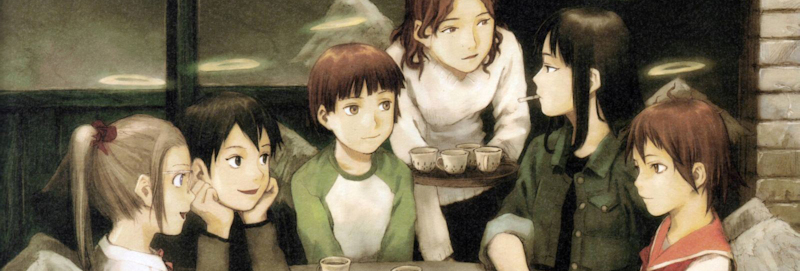
Always different, always the same
Both series retain a sense of humour, though display them differently. Haibane Renmei is more likely to rely on brief moments of embarrassed admittance (using the halo delivery dish to develop a new baked good) whereas Angel Beats is more prone towards the non-riotous riotous humour (well when one cannot die why not do anything other than go big on the pain?). Why non-riotously riotous? To me it’s the breeziness of it all. Traps all in place, the Afterlife Battlefront delve into their underground factory, only to be (semi)killed off absurdly. Each act of murderous defence is wonderfully ridiculous but the series quickly moves on. Like the recap episode in Kill la Kill, where it suddenly stops and says, well that was enough wasn’t it, let’s not waste time… and gets right on back with the outlandishness. Angel Beats takes the same approach, never allowing the mechanics of humour to defeat the overall pace – just as it doesn’t allow the musical numbers to stop an episode dead in its tracks. And there are nice iconoclastic touches, the initial descriptions of all the characters to Otonashi undermines a whole series of anime tropes in one fell swoop.
Where the series do diverge – excepting tone, story, those trivial things – is Haibane Renmei really focuses more deeply on a smaller set of characters, whereas Angel Beats stretches its wings (sorry) a bit wider. Of the two series I would have to say I think Haibane Renmei gets it right in this regard, though the tone of both series is different nevertheless both want you to invest in the protagonists and because Angel Beats tends to cast its net of characters wider it does sometimes distract from really giving enough time to the main cast. Then again, had they done it differently would I have thought differently? It is possible, as Haibane Renmei mainly balances story with character, whereas Angel Beats balances character with story and humour. Many of the supporting cast of Angel Beats appear at opportune moments and are well thought out, though there are one or two that feel like could easily be omitted but frankly this is quibbling.
(An)Amnesia
I said I’d get the obvious out of the way first, except I haven’t entirely… both series include main characters that have lost their memory. Both deal with it differently – memory is more integral to Haibane Renmei and tends towards the more mysterious – it also leads more dramatically to the denouement. Angel Beats treats it more conventionally - cue flashback episode as memory is recovered. Both though handle it well. As a personal preference I’d take the Haibane Renmei "less is more" approach, but then maybe that’s a horses for courses scenario, less a critical appraisal and more a case of what the viewer prefers. Even when you think you understand memory in Haibane Renmei there are underlying questions (return for instance to the suicide question) that as a viewer you can make a choice about. Angel Beats gives us an explicit recounting of memory and it’s probably fair to say that Haibane Renmei’s more opaque approach would not at all suit a series adopting the tone that Angel Beats has chosen. In terms of both shows it’s absolutely integral to the story: Otonashi wouldn’t be in school-limbo otherwise and Rakka would have no need to help Reki in Old Home.
The Elephant in the anime room
Though it’s been a million years, give or take, since I read it, numerous elements of Haibane Renmei are similar to The End of the World, part of Haruki Murakami’s A Hard Boiled Wonderland and The End of the World, including the walled cities and a sense of the fantastical that tended to run through Murakami’s earlier novels. I’ve always found it odd that I’ve never seen any parallel drawn between the two – not that it would be disparaging either way, rather Haibane Renmei has a similar arena to The End of the World if the story it tells, the characters it develops, are all quite unique. Still it left such an impression I felt the need to mention it and leave it at that.
Speaking of uniqueness…
Both series do feel quite unique in a wider sense. Angel Beats, though it uses a pretty normal set of circumstances in many ways, manages to be quite subversive and unusual but I struggle to define how. It sidesteps so many tropes, or plays with them, though at the same time retains many. Nevertheless just a few short episodes into my second acquaintanceship with Angel Beats it reminded me how fresh it was, how the same but so very different. Perhaps it’s how the story truly hits the ground running and like all those that follow the Afterlife Battlefront commander, Yuri, it rarely gives you pause to catch your breath. Kept ever on the move we’re constantly provided with new and tantalising movements of the story and never so that it overloads you, or else throws a ton of backstory or lore at you in a way that suggests depth but really illustrates how little the series seems has to offer (I’m reminded of giving up on Captain Earth, after it figuratively vomited exposition over me in a bid to tantalise but instead felt like a dreadful mess and not worth my time).
Haibane Renmei’s uniqueness is like that of (the delightful) Mushi-shi. Maybe it’s a reflection of which anime series find their way over here. Underplayed (dammit, underappreciated) and avoiding much of what was considered wrong about anime back in the days of VHS (sex, violence and bad dubs with as much swearing as could be crammed in). Similarly I’ve always felt that the gentle, heartfelt nature, quiet art style and subtle drama of Haibane Renmei – similarly Mushi-Shi – has the capacity to draw in new audiences who might otherwise be put off by the appearance of "childish" giants robots or magical girls. (Irony not lost on those that’ll go head over heels for the next Avengers movie and what’s the difference? Giant Robot or man in Iron Man suit? Not much really. It’s just what norms you are used to and what you are willing then to consider, based on what is done with conventions, but anyway…)
Both though are series I still desperately want to see more of. Not more of the same, but those that manage to take similar scenarios but pitch the tone, the story and the characters so that they really stand out as uniquely different and with more than a touch of greatness about them. True, you get the odd and sods of these: I loved Rascal Does Not Dream of Bunny Girl Senpai, The Rising of the Shield Hero, The Promised Neverland (excepting the dreadful black mammy character), and each is embedded in a genre and takes an avenue somewhat different: Bunny Girl like Haibane Renmei takes the drama to a slower burn and has a beautiful understanding between the characters, Shield Hero unearths the unpleasantness and the hope (not to mention the complacency) of being in an imaginary world (Donaldson would be proud), and Neverland has a beautifully murky morality, without any real heroes or villains (hmm, reminds me of Noir in fact).
It's frustrating then that so few other anime shows get things this right. It’s the Soul Eater / Broken Blade effect – plus the stuck at home too long in lockdown no doubt – where there are a lot of shows with promise, sometimes with interesting ideas at their core, that seem to cop out, with strands of complacency creeping in. Soul Eater couldn’t work out what the hell to do with all its storylines and its irritating cardboard cut-out villains (if they laugh maniacally they are a villain right? Yeah! Great, do it!) and general incoherence; Broken Blade's promise sinks under similar cackling villains and seemingly impossible foes, unkillable protagonists and both sides resorting to using psychos freed from prison, despite clearly being dangerous nutcases. Oh ye gods save us now.
Maybe I am being unfair. I know that I like the unusual, the artificial, but I can enjoy straightforward entertainment done right (Full Metal Alchemist Brotherhood being the perfect example). But I’ve loved Haibane Renmei for years now, even when first buying the DVDs I was pretty broke and couldn’t buy them in order, so really had to wait to watch them as I awaited the missing volume to be on sale. It’s a series that has stayed with me and I relish its humanity and mystery. Angel Beats was not as formative, but like other (slightly less) recent joys: Land of the Lustrous, Girls Last Tour and Flip Flappers, it's a series I'll likely want to watch again in another twenty years time. Both series join modern classics such as Madoka, Black Lagoon, Bakemonogatari, Evangelion and Noir as shows that really ought to be in every fan's collection - I worry only that they may go out of print. I don’t want them not to be available because, though I’m not sure if Angel Beats is a work of art, to me Haibane Renmei damn well is, and both nevertheless are more than just worthwhile uses of your time, these are enriching, creative and often exciting experiences.
Thankfully, MVM still have Haibane Renmei for sale on DVD; Angel Beats at least is on Crunchyroll and Funimation Now, so stop reading this and watch them instead. Really. Do.
Post script – life is not without its sense of irony; almost 24 hours to the moment that I finished the first draft of this do I take a recent purchase, Shigurui and what happens: the credits roll – proper credits - like Haibane Renmei it’s an orchestrated soundtrack, no pop song and definitely no heavy metal track. I must have been terribly cruel to kittens in a past life for such crushing ignorance to pound me to earth. Earth that the denizens of Angel Beats could use to make remarkable things. Live and in my case, oh so clearly, do not learn.

Long-time anime dilettante and general lover of cinema. Obsessive re-watcher of 'stuff'. Has issues with dubs. Will go off on tangents about other things that no one else cares about but is sadly passionate about. (Also, parentheses come as standard.) Looks curiously like Jo Shishido, hamster cheeks and all.
posted by Caitlyn C. Cooper on 25 Feb 2026
posted by Ross Liversidge on 17 Feb 2026
posted by Ross Liversidge on 13 Feb 2026
posted by Caitlyn C. Cooper on 02 Feb 2026
posted by Caitlyn C. Cooper on 31 Jan 2026
posted by Ross Liversidge on 30 Jan 2026
posted by Ross Liversidge on 27 Jan 2026